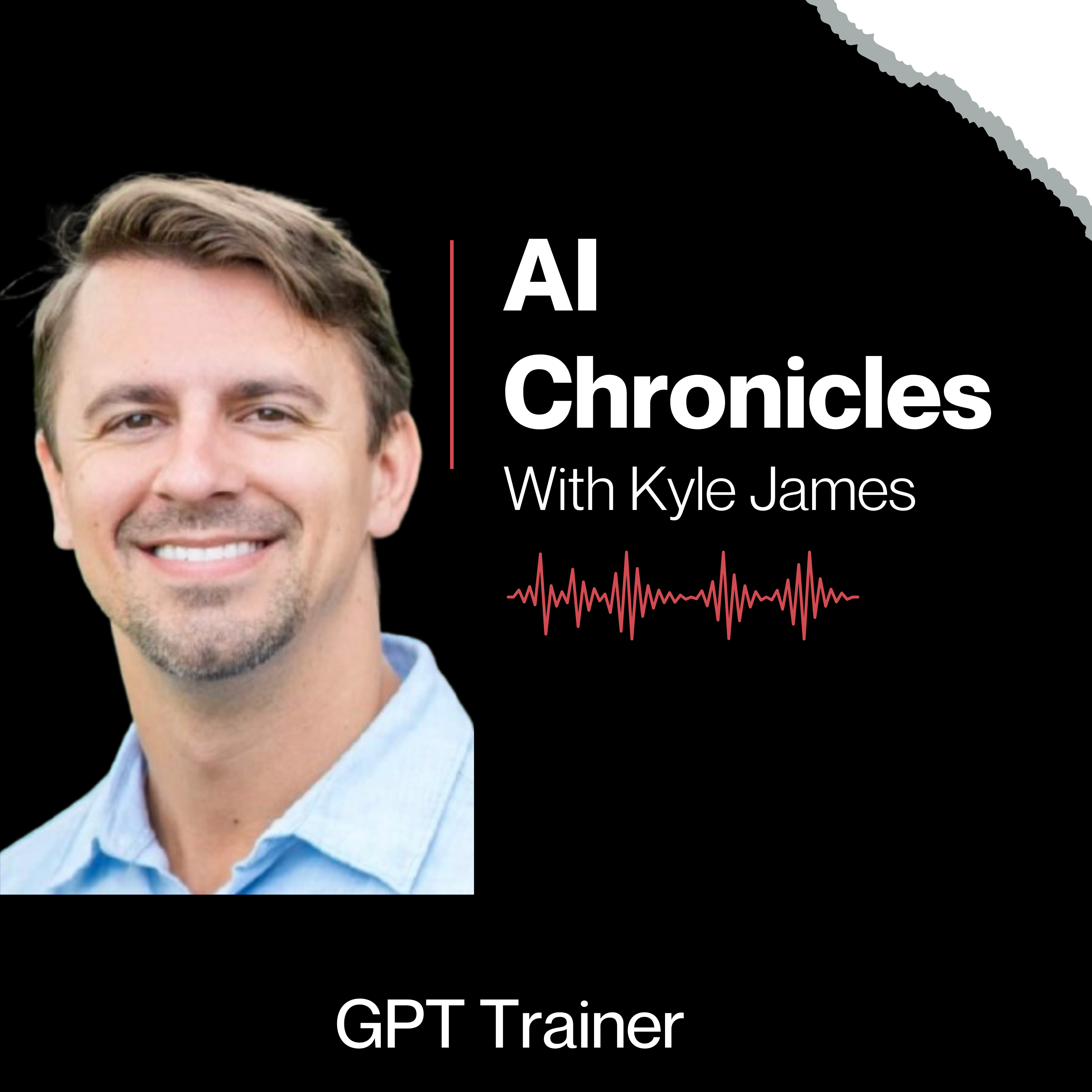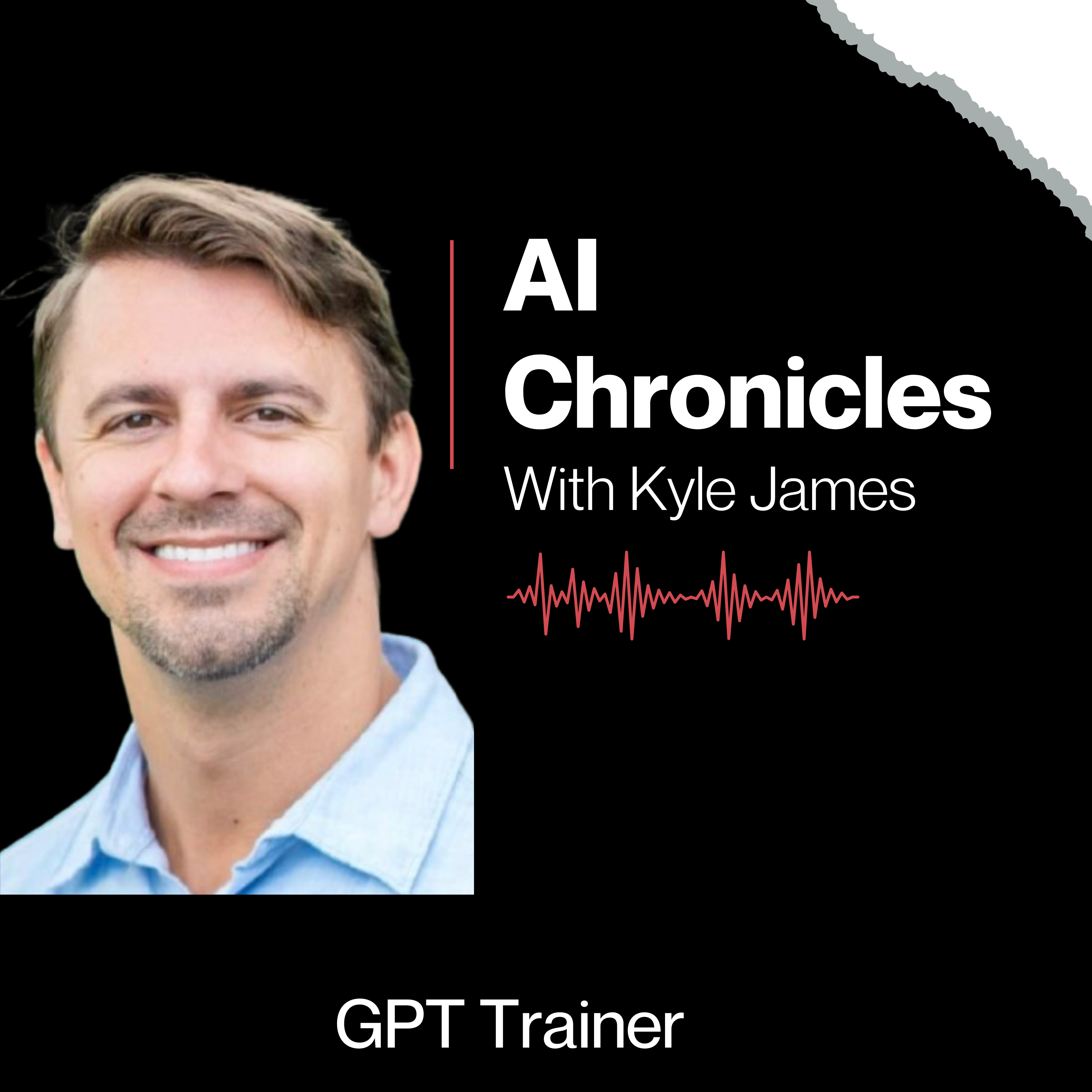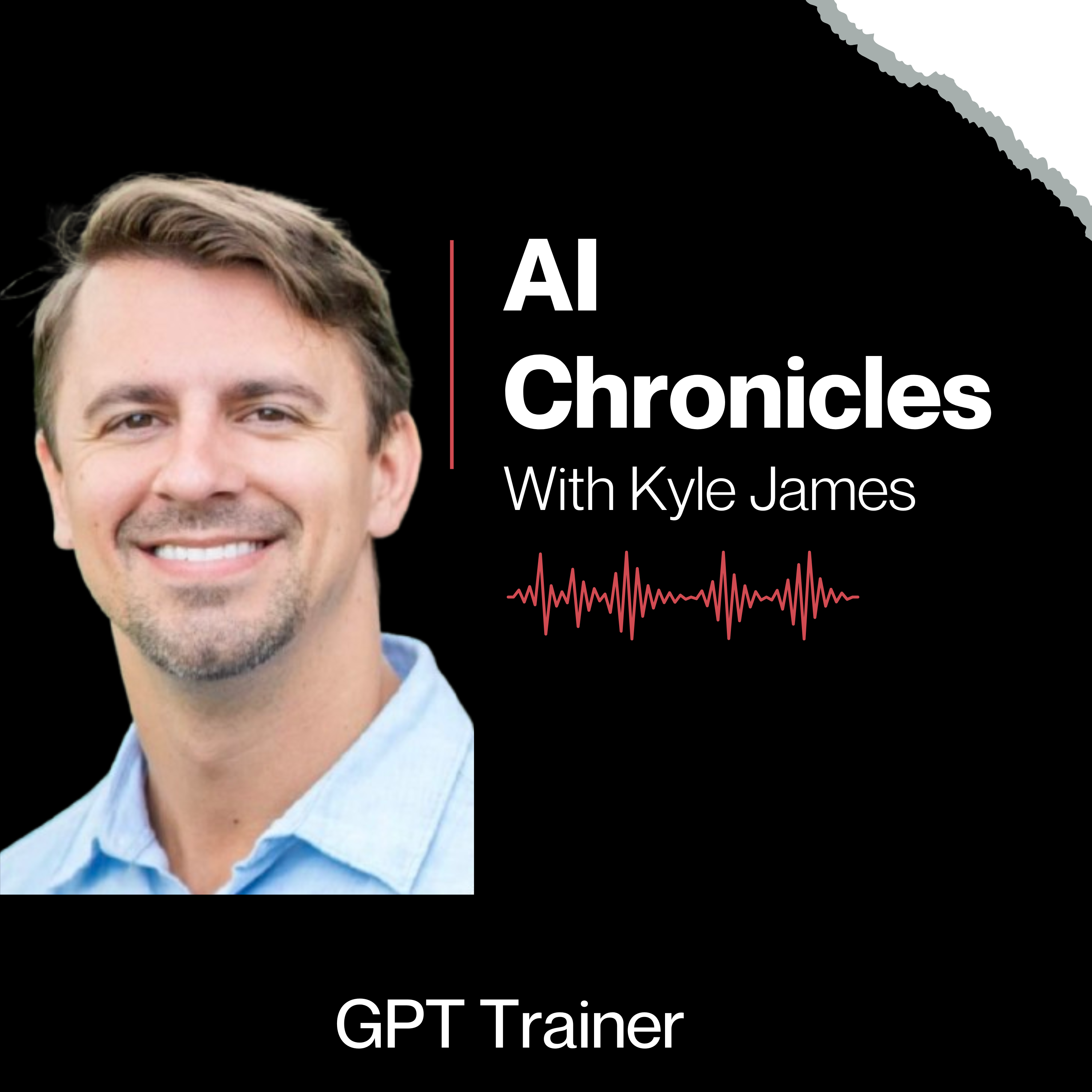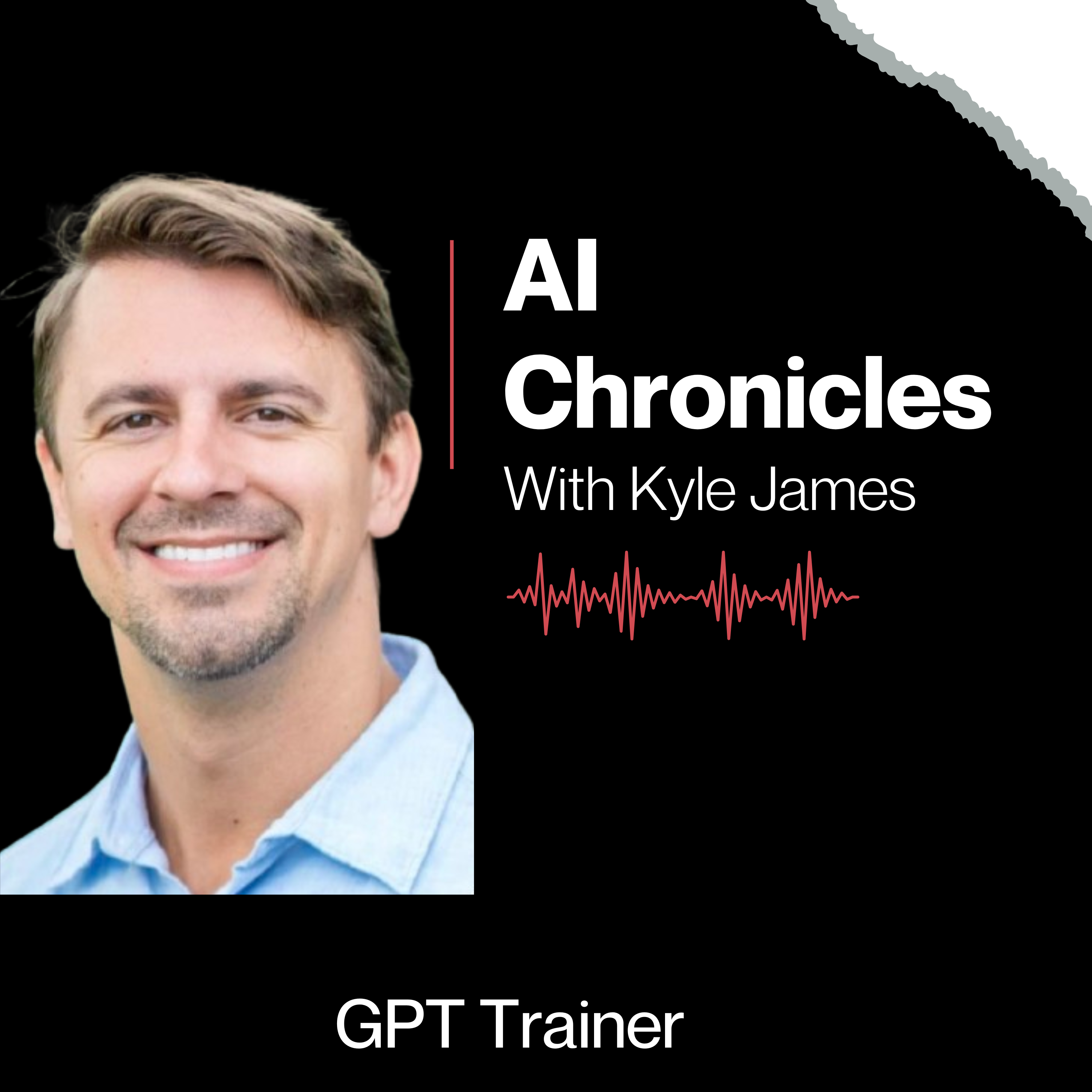Episode Transcript
Kyle James (00:01.253)
Hey, welcome to the AI Chronicles podcast. I'm your host, Kyle James. And today we're to be diving in headfirst into how a software company called Phonely is using AI inside of their own business. And we'll share the exact steps that you can take in order to implement AI for yourself. Now, before I dive into that, listen closely. Are you looking to implement AI inside of your own company or just struggling to get your AI to stop hallucinating? Speak to GPT Trainer. GPT Trainer literally builds out and manages your AI agent for you, eliminating hallucinations for good.
Go to GPT-trainer.com. I promise you, it'll be the biggest time saving decision that you've made all year. Trying to set up AI on your own is like trying to build a house from scratch. Sure, you could do it, but the time and frustration that's going to take you to get it finished just isn't worth it. It's a thousand times faster and safer to hire professionals. Scheduled consultation today. Once again, that's GPT-trainer.com. Say hi with me on the show, Will Bode Davis.
who is an ex-PhD AI researcher and the founder and CEO of Phonely. Phonely is a Y Combinator backed startup that makes it easy for businesses to answer their phones with AI. So excited to have this call today. Hey Will, welcome to the show. How are you doing today? Happy 4th of July to you.
Will Bodewes (01:17.314)
Yeah. Yeah. Thanks, man. Super excited to be out here.
Kyle James (01:21.337)
Yeah. So tell for those listening in today, like what exactly is phone Lee and like, give us kind of like the background. How did you, how did you find the company and like, exactly does it do?
Will Bodewes (01:31.01)
Yeah, so Foamly is basically the easiest way that any business can get set up and build a voice agent. So we think about what we do is kind of a conversational canvas, meaning that we make it really easy for you to connect voice AI to your tools, like your scheduling tools, your CRMs, your text messages, sending emails, all of that kind of stuff. So, you know, all in all Foamly is basically just a platform. You can build a voice agent that's going to interact with your calendar, schedule appointments, do whatever you need.
just like a person.
Kyle James (02:02.181)
Yeah, love that. it's a walk me through like a little bit. I mean, there's so many, so many different companies out there. Why, why the voice AI? Like, why did you take that? Cause I know you've got the research experience, like walk me through like how you went from research to, you know, starting a company in the voice AI space.
Will Bodewes (02:18.092)
Yeah. so yeah, I was getting my back. was getting my PhD doing artificial intelligence research and, you know, doing a lot of this research and I really found that. Like I wanted to apply it somewhere. And I felt that like voice and answering the phone was, was a really big pain point for a lot of businesses because it's very inefficient for the business to have to hire people to answer the phone. but it's very convenient for a customer who wants to call. And so I just kind of like envision this world where
anybody could pick up the phone, they could immediately get the information that they needed without having to like scroll through a website and like entry information on a form. We can communicate like we've been communicating for millions of years as human species and get exactly what we need done. And so I started working on this with the assumption that like voice AI was not just about its ability to talk and sound like a person, but really its ability to interact with software, interact with tools and make that process really
really seamless and really human-like and realistic. I guess a lot of what inspired me to build Phony was talking with my dad who was a small business owner and just being like, hey, what would you need for Voice AI to be able to work in your business? And he basically listed out, needed to be able to connect to my system, I needed to be able to accurately follow instructions, I needed to be able to know my information over my website, and then manage that in a...
simple and easy interface to use. So that's basically what Foamy has evolved to be.
Kyle James (03:50.053)
Yeah, I've, I've seen like, you know, I've, I've obviously in the AI space, I've seen like chat GBT and like how you can do the voice AI. And like, I've seen a couple other platforms as well. Like when I was testing out on phone, Lee, one of the things I noticed was like, sounded, I mean, one of her sentence, not a realistic, but I think the biggest thing was like, it was very quick to respond. Like, it's not like some of them, I hear like the, you know, that one to two second gap and you're like, Oh, I could tell this is AI here, but maybe someone else they might be able to tell, but like, I could tell, but on phone, Lee, was like, this sounds like a real person.
I'm just talking about whatever, whenever, and then at the very end of it, ask those follow-up, they're asking that follow-up question. And I don't think there's anything else on the market like that I've seen like this.
Will Bodewes (04:31.15)
Yeah, so I mean, to kind of break down like what we're doing under the hood, obviously you guys have a, you know, a lot of people that are really interested in AI, so I thought I'd try to give away a little value here. You know, what makes a voice agent sound like a person, right? So, you know, piece one is you have like real conversational voices, which there are a lot of companies that are working on, and we employ to make phone that work. that's step one is voices that talk like person.
Now these voices are actually using text generated by a large language model, which is like the next step down from the funnel. And so the large language model needs to be able to dynamically respond in real time and then input like vocal ticks, input like pauses at certain points, and kind of handle that stuff. So that's like a next step down of how do you make an AI sound like a person. And then the next piece that you have, in my opinion is...
the end pointing. So we need to figure out when you are done talking, which is actually a relatively hard problem to solve because people on their own, we use a lot of different like visual cues or audio cues to figure out when the human is actually finished talking. And that's actually something that's relatively hard for the AI to do. And so what we ended up doing was we actually had to train our own like end pointing model because we didn't want to like wait for a, you know, 400 milliseconds or 500 milliseconds for the person to finish talking. We wanted it to like,
immediately respond right away as soon as we thought that person was done. So I guess like, how do we make the AI, like how do we make it so fast? Well, we do all of those things. And then what we do is we, we basically take those services and we run them in a cloud right next to each other so that they can communicate back and forth really, really quickly. So that helps us like reduce latency, which is what most of these systems have in place. It's just like the latency it takes for your request to go from this server to this server, to this server. And so what we did was you just like,
locally deployed a lot of that just on our own premise. And then we worked with other companies like Grok to fine tune specific models specifically designed and built for voice so that we can reduce the latency piece, especially around the LOI.
Kyle James (06:34.597)
Yeah. Yeah. That's amazing. Like, so it's like on the back end, it's really, it's really more to it than just like a plain voice. Like there's so many moving pieces that like, cause I think the timing is so critical here. Like, I mean, like I said, when I was so quick to respond, but even like the, the tonality that I was hearing from the AI, was like, wow. And not only that, but even the length, you know, the AI is typically you'll hear like this, perfect word, the perfect sentence, but even the AI was like saying things like, like, and, stuff. And like, was like, Oh, like, wait, hold on. Is this an AI like, or is this actually a human?
And that's, think that's the key difference that's really helping you to scale where like now you have, mean, what would you say your rep, I don't want say, I won't ask that on a podcast, but obviously you guys have been scaling pretty significantly of these past what, couple, couple of months, at least what wouldn't you say?
Will Bodewes (07:20.076)
Yeah, really over this past year. like since we basically launched the company, it's been, you know, kind of been up into the right growth curve between, yeah, 20 to 40 % growth up month over month. So it's just been like, yeah, we're getting really busy at this point.
Kyle James (07:34.019)
Yeah. So talk to me a little bit about some of like, you mentioned, love the example of like you said, your dad has a business and, you know, this is what he needed in all the integrations. Like walk me through kind of like the results that you've been seeing maybe for some of your clients and maybe some of that feedback that you've been, you've been gathering, since you've been implementing a lot of the AI voice inside these businesses.
Will Bodewes (07:53.666)
Yeah, for sure. I when we first started, you know, it was, were just like happy to get like one or two good responses with like the AI voice, right? And that was, you know, like maybe two years ago when I first started working on this. But as we've, you know, as we've gone further and further, we're not, we're not just like being able to match human performance with a lot of these conversations. Like some were actually beating human performance. And we know this because we work with a lot of companies that have like,
they do qualification of leads and they do other stuff like that. And so they know that their human reps transfer over, qualify maybe 50 % of these customers and work like 65 % on some of those cases, right? So we're actually beating them by a significant margin. The reason for that is because what we can do with AI and with voice AI is we have all these like new knobs and dials that we can turn that was previously impossible in a human conversation. So we can adjust the tonality, we can adjust the voice that we use.
Kyle James (08:33.668)
Wow.
Will Bodewes (08:49.666)
We can adjust exactly what it says at this moment, and then we can scale that a million times over and just figure out the most optimal thing designed for conversion in that use case.
Kyle James (09:00.258)
Yeah, yeah, that's it. That's incredible. And I imagine you can make a lot of changes and customizations. Like if I'm a business owner and I want to change it from a male voice to a female voice, or if I want it to be like a a higher tone or lower tone, like I can make all those changes with it.
Will Bodewes (09:02.862)
Yeah.
Will Bodewes (09:08.526)
You know what
Will Bodewes (09:13.294)
or multiple different languages as well. That's the other thing people forget about. With AI, it's like you immediately have access to all these new languages. so people that, you you don't have a US agent or a Spanish agent on the line, people just hang up. But whereas phone, they can respond, switch the language, continue the conversation.
Kyle James (09:28.985)
Hmm.
Kyle James (09:32.707)
That's game changing. then like, imagine like just so like, you know, especially smaller business, medium businesses where they can't, maybe they're not in a place where they can hire like people in different languages. They could have the voice AI like with phone Lee. And now they don't have to turn away 10, 15, 20 % of these, these other customers who speak a different language. That's that's, that's crazy.
Will Bodewes (09:55.086)
Yeah, exactly. And I think what we're seeing, like, it became getting adopted a lot is like anywhere we're contributing to top of funnel. So, you know, a lot of our businesses really care about what this when they they're like, wait, by having an AI voice agent after hours, we can, you know, capture all these leads that are coming in when nobody is available or maybe when our rest of our staff is busy or even like front of line. Like we scale so well and we just allow like even, you know, that's what gets me really excited. It's like we allow even the smallest of business to
know, see some very valuable ROI with what we're doing. And we're saving them a bunch of money over what it would cost to like hire a third party outsourcer, you know, or a human agent as well.
Kyle James (10:35.333)
Yeah, absolutely. So one of the things I saw as I was on your LinkedIn, I saw that you, uh, you're hiring for salespeople and I think you're hiring for other couple of roles too. And, and you mentioned like the close ratio, like going with like 50 % and the AI is like 65%. Like, like how, how is it that like, um, uh, just want to hear your perspective on this, like to go from, you know, seeing these increasing close ratio on the AI voice, but that at the same time, you're like, you're still hiring humans. Like, how do you like,
Why? Why still hire humans on the sales side?
Will Bodewes (11:06.574)
Yeah, I think it's important to know where the qualification piece of that is, So that's the initial qualification of customers. So people are calling in, they're kind looking for more information. This is really high volume customers that are qualifying a lot of leads. So we're just trying to get to the qualified state. This is not necessarily closing a sale. But I still think that a lot of business is built on relationships.
And when we're starting to talk to these larger enterprises and these big organizations, mean, we've got hundreds of thousands or tens of thousands of people that are working there. And that is something that's not just going to be trusted to an AI. It doesn't matter how human-like it is. There's still that piece of like, I want to go to dinner. I want to meet them at a conference. want to create this human experience because business is done with people. And we can use AI to help augment that. But there's still so many human elements.
Kyle James (11:55.235)
Hmm.
Will Bodewes (12:00.431)
that are important, especially when somebody's making that purchasing decision.
Kyle James (12:03.701)
Yeah. I almost like, like kind of like the tip of the spear here, like where it's like going from like a marketing qualified lead to a sales qualified lead. Like once you have get to that SQL, then it's like, okay, now let's introduce the human part. Because like you said, well, like the human interaction, especially in this day and age of AI, like I think humans are going to enjoy so much more being with humans because we're going to get to a point. I think we're, Hey, is this an AI? And I think we're probably get to point with all the robotics where it's going to be like, Hey, are you an AI? Are you a human? And then like legally they're gonna have to tell us.
Will Bodewes (12:10.274)
Yeah, exactly.
Kyle James (12:32.119)
I'm an AI or I'm a robot or I'm a human or whatever. So that's a really cool perspective. I guess going into, mean, there's so much change happening. What would you say are some of the maybe upcoming AI initiatives for Phonely and where do you see AI playing maybe like the biggest role in your operations next?
Will Bodewes (12:50.146)
Yeah, that's a good question. I think what we're focusing a lot is just improving some of the architecture of the LLMs that are out there. So right now, we've done some fine tuning on our own. We've used some of OpenAI and Claude and some of these other models. But I think where we're going to keep going is we want to keep building better and better models, because we have spent so long in this space. So we're like, I know exactly the model that I could build that would
you know, be faster, be better, be cheaper than a lot of what's on the market today. And that's what a lot of powering is filming. And I would like to release that to more people so that they can use it. So I think that's like one side from the infrastructure layer that we're going into. And then the other, you know, the other angles of like how we're using AI and automation in our, in our business in general. think that the funny thing about, you know, we're in, we're in an AI startup and you know, everything is like moving a million miles a minute. It's like,
We could probably automate a lot more than what we do with AI. But the problem is we're just so focused on building the product, working on that. I think that I would like to take some time back and say, okay, let's go and automate some of these tasks. And I know the team at OpenAI pretty well, doing some of that stuff. And it was kind of funny in the earlier days, they were like, yeah, what do you guys think we should do? They didn't have the best practice either, which you would assume that they like...
Kyle James (14:04.421)
Haha
Will Bodewes (14:11.458)
You know, like, you, know, all this stuff you should be, but a lot of times they're like, yeah, we're just going to wait for a service to come out. That's using our API. That's a better job. I mean, that was funny. Yeah.
Kyle James (14:21.081)
That's so funny. I love that. It's like, yeah, like they're like as big as they are, they're like, we're, actually riding this wave too, bro. Like I don't know. I don't, I don't have like another boat for you to hop on and sit, you know, sit on. now that's awesome. So you said though, you said like improving the art, like the architect of like the LLMs and like building better models. Like, you saying like, like, what do you mean exactly by that? You're talking like, because my mind went to like building your own type of LLM, but are you like, how would he like,
Will Bodewes (14:26.766)
Yeah.
Will Bodewes (14:32.45)
And that's, yeah.
Kyle James (14:47.673)
Walk me through what that means. I'm just really curious.
Will Bodewes (14:50.078)
Yeah, for sure. like large language models were trained on a bunch of text data, right? So they respond like you would chat. And so to get them to respond like you would talk, you have to do a bunch of prompt engineering, you have to do a bunch of, you know, other stuff to get them to work, you know, decently well. But what we can do is what, and then, and then that's one thing. And then the second thing is like a lot of these large language models, they're expensive and they are slow. And so these bigger models, the bigger they get, the slower they get, the more costly they get.
And so what we have the opportunity to do is like say, hey, we know we're just focusing on voice. We know it only needs to do a few things and it needs to do them really well. So it needs to talk like a person. It needs to understand that it needs to gather information, interact with like a transcription model, like do a couple of things. So we just have like this laundry list of things that we know it needs to do. And then there's all this other stuff that it doesn't need to do. And so we can build a model that's lightweight, that's fast, that talks like a person.
and then we can deploy that for other people building in the voice space. I think that could be incredibly valuable, but also for our own customers, it's just going to allow that performance of voice to get better and better.
Kyle James (15:56.613)
Man, I love that. That's, I think that's taken to the next like philosophical, innovative way, like stepping in these next couple of years in the AI space. think you guys are on the right track there. And for people listening in today, Will, like where, where can they learn a little bit more about you and where would you recommend them go to learn a little bit more about Phonely?
Will Bodewes (16:12.172)
Yeah, absolutely. My LinkedIn is where I'm most active. So if you just go to Willow Bow Davis on LinkedIn, you can usually find me within like probably before you get to the BOD of my name. And then if you want to check out our company, we do have a free plan. Really our mission at Phoneley is to, our goal is to give away as much as we can to, you know, smaller medium sized businesses and then make our money off of like enterprise organizations. So we have a free plan. You can get started. You can build a voice agent completely for free inside of our platform.
It can send a text message, send an email, integrate with your calendar, integrate with your CRM. You can just go over to www.phoneley.com sign up completely for free. We'd love to see you there.
Kyle James (16:53.893)
Awesome. Thank you so much, Will. It's pleasure having you on today and appreciate you making the time and sharing your perspective and sharing honestly like that. Everything you're doing over a phone. I think it's awesome what you guys are doing. And for those listening in, remember if you're looking to implement AI inside of your own business today, don't try and do it yourself. The time and stress that the AI could cause just isn't worth it. Schedule a call with GPT trainer and let them build out and manage your AI for you. Once again, that's gpt-trainer.com. Signing off for now. Have a great rest of your day, everybody. Appreciate you being on.
Looking forward to seeing everyone on the next episode of AI Chronicles.



